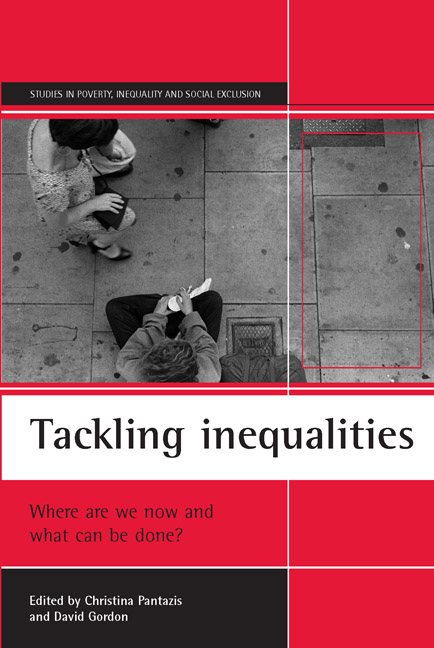Book contents
- Frontmatter
- Contents
- List of tables and figures
- Preface
- Acknowledgements
- List of acronyms
- Notes on contributors
- 1 Introduction
- 2 Inequalities in income, wealth and standard of living in Britain
- 3 Inequalities in employment: problems of spatial divergence
- 4 Educational inequalities and Education Action Zones
- 5 How can we end inequalities in housing?
- 6 Tackling inequalities in crime and social harm
- 7 Poverty across the life-course and health
- 8 Inequalities in health service provision: how research findings are ignored
- 9 A mortality league table for Cabinet ministers?
- 10 Ending world poverty in the 21st century
- Index
9 - A mortality league table for Cabinet ministers?
Published online by Cambridge University Press: 05 July 2022
- Frontmatter
- Contents
- List of tables and figures
- Preface
- Acknowledgements
- List of acronyms
- Notes on contributors
- 1 Introduction
- 2 Inequalities in income, wealth and standard of living in Britain
- 3 Inequalities in employment: problems of spatial divergence
- 4 Educational inequalities and Education Action Zones
- 5 How can we end inequalities in housing?
- 6 Tackling inequalities in crime and social harm
- 7 Poverty across the life-course and health
- 8 Inequalities in health service provision: how research findings are ignored
- 9 A mortality league table for Cabinet ministers?
- 10 Ending world poverty in the 21st century
- Index
Summary
Introduction: is it worth reducing inequalities in health?
The set of statistics presented in this chapter attempts to show how closely the distribution of voting mirrors the distribution of premature mortality in Britain. The chapter goes on to show how spatial inequalities in mortality are reflected in the spatial distribution of Members of Parliament (MPs) and, in particular, Cabinet Ministers. It will be argued that, given the unequal life chances of its constituents, reducing inequalities in health in Britain should be a priority for the New Labour government. It may be a little surprising that the Green Paper on health (DoH, 1998) set no explicit targets to reduce the inequalities described here. Similarly the government's Independent Inquiry into Inequalities in Health (Acheson, 1998) did not recommend specific targets and did not prioritise its recommendations (Davey Smith et al, 1998). The government has still to respond to the Inquiry's report other than in saying it would form a “key input” to policy, and this was only a press comment from Frank Dobson, the Secretary of State for Health (before running for mayor of London).
The chapter shows that every year analysed in the 1990s 119 people have died unexpectedly and prematurely in Frank Dobson's constituency of Holborn and St Pancras. This is because people aged below 65 in this constituency have a mortality ratio 50% above the national average, the 21st highest in the country and the 2nd highest among the constituencies of Cabinet Ministers. In the 1980s, Holborn and St Pancras had a mortality ratio for this age group that was 38% above the national average, which meant that 49 fewer people aged below 65 died unexpectedly per year compared with the 1990s rate. Inequalities in mortality are increasing, with the effects being seen most clearly among the constituencies of the people who voted for the ministers of the current government. Since Frank Dobson became MP for Holborn and St Pancras in 1979 at least 1,500 more of his constituents (in absolute terms) will have died prematurely than in the average constituency in Britain. The primary reason for this level of inequality in health is inequalities in wealth, most obviously reflected through levels of poverty. In Frank Dobson's constituency 36% of all households and 56% of households with children live in poverty, compared with 21% and 27% nationally (using Breadline Britain methodology – see Gordon and Forrest, 1995).
- Type
- Chapter
- Information
- Tackling InequalitiesWhere Are We Now and What Can Be Done?, pp. 181 - 210Publisher: Bristol University PressPrint publication year: 2000



